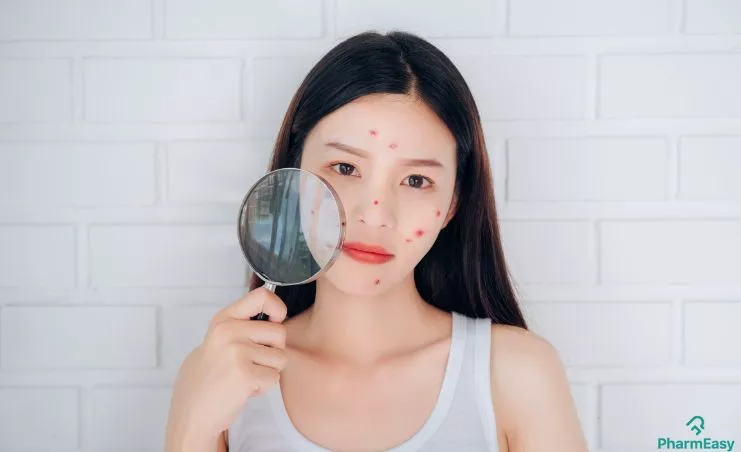Effective Ways And Homemade Masks For Treating Acne
By Dr. Nikita Toshi +2 more

Get,

to manage your symptom
Get your,


4 Cr+ families
benefitted

OTP sent to 9988776655



You’ve successfully subscribed to receive
doctor-approved tips on
Whatsapp

Get ready to feel your best.

Hi There,
Download the PharmEasy App now!!


Register to Avail the Offer
Send OTPBy continuing, you agree with our Privacy Policy and Terms and Conditions

Hi There,
Sign up on PharmEasy now!!
Trusted by 4 crore+ families

OTP sent to 9988776655



You have unlocked 25% off on medicines




Code: NU25
By Dr. Nikita Toshi +2 more
Pimples are the worst or embarrassing thing we all get especially during puberty age. Acne (Acne vulgaris) is a chronic condition which is most commonly occurs on the face, neck, shoulders, chest, and back. Acne is the most common among adolescents but it can persist into adulthood and during pregnancy.
Table of Contents
Acne (Acne vulgaris) is non-contagious, chronic, inflammatory condition of the skin caused due to blocked hair follicles with oil (sebum) and dead skin cells. It is usually associated with hormonal fluctuation during the teenage years. There are various types of acne from simple to severe form. Usually, oily skin is more prone to acne than dry skin. Acne doesn’t just affect people’s skin but impacts their quality of life too.

There are mainly two types of acne –
Acne occurs due to multiple factors. Acne forms when the tiny skin pores are clogged with oil and dirt. Here are some causative factors of acne –
Did You Know?
When there is mild acne, you should try self-care remedies first and other options. The best treatment is to prevent the production of sebum, keep your skin clean, and bacteria-free, and encourage shedding of the skin to unclog pores. Besides that acne treatment is purely based on the causative factor.
Self-care treatment for acne –
Acne can be mild, moderate, and severe. The treatment depends on its severity and intensity –
Mild acne can be treated with some remedies and over-the-counter (OTC) drug medications like gels, and ointments. Here are some OTC medications for acne –
These preparations may cause some side effects such as skin irritation and burning. Hence always use it in low strength.
It is always better to consult a dermatologist if you don’t have control or prevent acne. There are various options to treat moderate to severe acne.
For mild acne, you can try homemade masks to prevent acne and scarring.
Turmeric is always on the top when it comes to beautiful skin. Turmeric has anti-inflammatory, antiseptic, and antioxidant properties. For a facial mask, mix ½ cup of chickpea flour, 2 tsp of turmeric powder, and ghee or almond oil and combine them with water to make a paste. Apply it on the skin for 5 minutes and rinse with the cold water. Turmeric can treat and prevent acne and scarring.
Cucumber has a soothing effect on the skin, reducing inflammation, irritation, and pain. For better results, make a paste by blending one small cucumber and 1 cup of oatmeal. Apply this paste on the affected area for 30 minutes and rinse.
Honey has anti-bacterial properties which are used for inflamed acne, wounds, and burns. To get rid of acne, apply honey over the face for 30 minutes, and then wash it with lukewarm water.
Yogurt is a probiotic that inhibits the growth of bacteria. To make a mask, combine 1 tsp of yeast with a little plain yogurt and mix it. Apply it on the skin for 15 to 20 minutes and wash it with cold water.
This one basic kitchen staple is a game-changer. Egg white is the one ingredient that is known to destroy acne-causing bacteria due to its high lysozyme content. Not only that, but egg whites also contain astringent attributes that help in the removal of dirt, grime, and surplus oil that clogs the pores. Apart from the important role it plays in giving your skin a healthy glow, it also possesses anti-inflammatory properties. The lysozyme protein creates a form of protective layering which helps in soothing inflammation.
Exfoliation is one of the most amazing benefits of bananas. It ensures that your skin gets rid of the dead cells that accumulate on it and even eliminates the unwanted sebum that sits on your skin. Adding lemon to the banana ensures that while the banana takes care of removing the excess sebum, it helps in drying out the remainder of it which is otherwise difficult to extract along with destroying the bacteria that cause acne.
Disclaimer: The information provided here is for educational/awareness purposes only and is not intended to be a substitute for medical treatment by a healthcare professional and should not be relied upon to diagnose or treat any medical condition. The reader should consult a registered medical practitioner to determine the appropriateness of the information and before consuming any medication. PharmEasy does not provide any guarantee or warranty (express or implied) regarding the accuracy, adequacy, completeness, legality, reliability or usefulness of the information; and disclaims any liability arising thereof.
Links and product recommendations in the information provided here are advertisements of third-party products available on the website. PharmEasy does not make any representation on the accuracy or suitability of such products/services. Advertisements do not influence the editorial decisions or content. The information in this blog is subject to change without notice. The authors and administrators reserve the right to modify, add, or remove content without notification. It is your responsibility to review this disclaimer regularly for any changes.

Leave your comment...
Comments